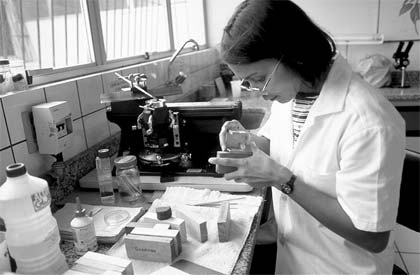Getting effective forestry research results from scarce resources
S. Appanah
Simmathiri Appanah is Senior Programme Adviser to the Forestry Research Support Programme for Asia and the Pacific (FORSPA), FAO Regional Office for Asia and the Pacific, Bangkok, Thailand.
Reflections from a workshop on strategies for innovative forestry research in Asia and the Pacific.
In general, public investment in forestry research in the Asia and the Pacific Region is lamentably low, especially since the 1997 Asian economic crisis. To explore ways and means to “do more with less”, a group of researchers, managers and representatives of non-governmental organizations (NGOs) and the private sector in the region came together in the regional workshop “Getting Effective Research Results from Scarce Resources: Strategies for Research and Innovation in Forestry”, held from 2 to 4 December 2002 in Colombo, Sri Lanka.1
The workshop addressed the concern that the traditional public-sector monopoly of forest research, in the shape of the national forest research institutes (NFRIs), is beginning to be perceived as an obsolete institutional model for tackling current forestry problems. To avoid decline and marginalization, these institutes need to adapt to the rapidly changing environment and to devise more innovative ways of getting results.
Important points that emerged from the discussion include the following.
- The role of science is evolving. The need for “traditional” research is declining, and to adapt to new needs, NFRIs will have to take on the role of service enterprises and knowledge brokers.
- “Know your donor” if you want more resources. Research institutions need to recognize donors’ priorities in order to attract finances for forestry research in a competitive environment.
- Why not involve the beneficiaries, and make them pay for it? A stakeholder-driven approach can improve the quality and impact of forestry research in developing countries. In Malaysia, for example, public institutions, with suitable policy revision and other strategies, have been able to draw funds from the private sector to pay for research.
- Achieve more with less. New and developing technologies such as remote sensing and geographic information systems (GIS) make research cheaper. Judicious investments in appropriate hardware, software and training can bring poorly funded NFRIs into the forefront of research.
- Some are making money doing research! A private agency in India, Tata Energy Research Institute, has made a credible foothold in forestry research through innovative approaches such as marketing of services and technologies. Also in India, environmental NGOs are operating on the border of research and advocacy to bring about results.
- Finally, who said there is a scarcity of resources? Perhaps resources are not scarce, but have shifted from government to business and civil society. Research institutions need to compete effectively for these potentially abundant resources. NFRIs should therefore build partnerships with others for support and access to particular skills.
The workshop concluded that there are many innovative ways to undertake research. Improvements can be made on three broad fronts: improving the efficiency and accountability of research; forging linkages with other research partners; and mobilizing resources for research. FORSPA is compiling the proceedings of the workshop, which are expected to be ready by June 2003.
 |
FAO FORESTRY DEPARTMENT/CFU000470/R. FAIDUTTI |
1 The workshop was organized by FAO’s Forestry Research Support Programme for Asia and the Pacific (FORSPA); the Asia Pacific Association of Forestry Research Institutions (APAFRI); the Sri Lanka Forest Department; the International Union of Forestry Research Organizations (IUFRO) Special Programme for Developing Countries; the United States Department of Agriculture – Forest Service; the Canadian Technology Network (CTN); and the Center for International Forestry Research (CIFOR).
|


